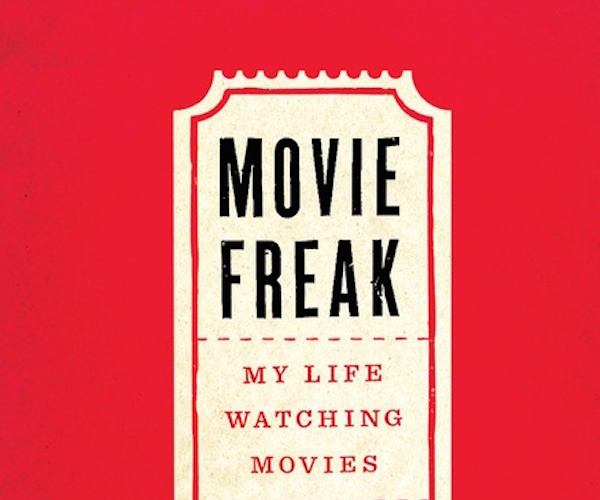Book Review: “Movie Freak” — A Critic Who Doesn’t Hold Back
If Owen Gleiberman has any complaint against today’s world of criticism it’s that everyone seems to be speaking in one voice, especially on the Internet.

By Gerald Peary
My fifteen years as a Boston Phoenix film critic saw me writings shorter and shorter reviews until the day in 2013 that the newspaper shut down. Owen Gleiberman came to the Phoenix in earlier flush days, the beginning of the 1980s, when reviews were typically essay length, and they could go on forever. The model at the Phoenix was Pauline Kael’s film column in The New Yorker; and many of the Phoenix critics not only wrote trying to emulate Kael’s snarky, flamboyant style but they copied her opinions, adoring and despising the same movies she did. As Gleiberman tells us in his cine-autobiography, Movie Freak: My Life Watching Movies (Hachette Books, $28), he was hired at age 22 by the Phoenix because Kael had recommended him for the open job as the second-string critic. He had fallen hard for her New Yorker writing, and sent her fan notes when he was arts editor for The Michigan Daily at the University of Michigan. He mailed her reviews, she approved of how he wrote. He would become the youngest “Paulette” at the Phoenix.
I was chief film critic for the rival The Real Paper and a decided non-Kaelite — The Village Voice’s Andrew Sarris was my biggest influence — when Owen Gleiberman arrived in Boston. In his book, he described me as “the charmingly self-righteous left-wing echt-boomer critic.” In turn, I thought his politics were too centrist, and he was awfully full of himself for a guy who just graduated college. And here was a major difference in our approach to film criticism: I religiously read the book on which a movie is based before seeing the movie. Gleiberman has always had a policy of only seeing the movie. I’m not sure that he ever reads the book! Aside from movies, rock music is Gleiberman’s obsession, not literature.
Kael was famous for dismissing sanctified arthouse favorites as being ponderous and unwatchable. Don’t get her started on Hiroshima, Mon Amour. Gleiberman easily followed in her track, displaying, I thought, a kind of smartass anti-intellectualism. He shocked my fellow critics, I recall, by saying in a radio talk that he preferred the American remake of Breathless to Jean-Luc Godard’s 1959 New Wave classic. And don’t get him started about Jules and Jim!
Still, I liked Owen. He was fun to chat with. And I’ve continued to enjoy his company when I see him occasionally through the years. He left Boston behind for New York City. Fired by the Phoenix, he reinvented himself as the formidable critic for Entertainment Weekly. For several decades, I read with appreciation his reviews there. He is a featured player in my documentary, For the Love of Movies: the Story of American Film Criticism, where, as in his movie writing, he is sharp and frank and an original.
The only other film critic to publish the story of his life is that massive self-promoter, Roger Ebert. But he did have the excuse that he was enormously famous, and his fans were eager to know his story. But what about the far-far-far less-known Gleiberman? Is it galling hubris on his part to believe himself worthy of an autobiography? When the giants of his profession in America never tried such a feat? James Agee, Manny Farber, Sarris, Stanley Kauffmann, or Kael herself.
Well, the book is absurdly long, 326 pages where a hundred less would have done the job. Gleiberman quotes far too often from his old reviews, and he stops at too many points in the narrative to offer a page or more of new insights about movies he loves. I did some skipping here, not that interested. And should readers really care about all the executive changes of personnel at Entertainment Weekly? Or, after a point, about Gleiberman’s sexual and romantic hangups?
Still, Gleiberman’s story is well deserving of telling. He’s a lively writer and an honest one, and he doesn’t hold back. Movie Freak is worth reading just for the sections which trace his disillusionment with his hero of heroes, Pauline Kael. He comes to realize that she will not fathom any other opinion about movies than her own, even in conversation, and that he feels bullied into keeping quiet when he disagrees with her. And when he disagrees with her in print, he finds himself ostracized by the other Paulettes, who continued to repeat Kael’s views in their reviews. “How could people this intelligent and compelling believe so totally in what they’re saying… when it’s so often not coming from them?” Gleiberman asks. “It was about identity…the way they blended the assertion of fearless opinion with hidden subservience to the mind of Pauline made my head spin.”
(Gleiberman outs some of the Paulettes: Michael Sragow, David Denby, Stephen Schiff, Terry Rafferty, David Edelstein. There are plenty more, even a couple of women.)

Critic Owen Gleiberman, Photo: Twitter.com.
I am probably prejudiced because the film critic life has been my life, so I am primed to read reflections on my vocation. As someone who is often agnostic about this choice of profession — Is anyone reading me? Does anyone care? — Gleiberman provides a salutory antidote to my despondency. This is in line with other prideful “Paulettes” and ex-“Paulettes”: he regards film criticism as a calling. A proper way to spend your time on earth. After 35 years of being a professional critic, he appears to never tire of going to the movies, of finding wonderful surprises engaging with the cinema. He never loses his spirit.
He did lose his job, being fired by Entertainment Weekly in 2014. I miss his idiosyncratic takes on cinema. He’s the guy who has seen Natural Born Killers 40 times and calls the little-known Manhunter “the greatest thriller I’d ever seen.” He’s the dummy who can’t get Orson Welles’s majestic The Magnificent Ambersons and who genuflects before Oliver Stone’s forgettable Nixon and who mostly thinks (wrongly) that Fassbinder is a fraud. But he’s the only other critic besides yours truly who is unimpressed by There Will Be Blood and Pedro Almodovar and (this is heresy in the film critic world!) is totally mystified by the supposed Taiwanese master, Hou Hsiao-Hsien.
If Gleiberman has any complaint against today’s world of criticism it’s that everyone seems to be speaking in one voice, especially on the Internet. I agree. It’s not only the Paulettes who echo opinions. In 2016, the world is falling over itself in praise of lightweight Wes Anderson and phony baloney Alejandro Iñárritu. I wonder what Gleiberman thinks of them. He would let us know. Says Gleiberman: “I became a critic because in some adolescent art-loving egomaniacal but earnest way, I yearned to tell the world what I thought.”
Gerald Peary is a professor at Suffolk University, Boston, curator of the Boston University Cinematheque, and the general editor of the “Conversations with Filmmakers” series from the University Press of Mississippi. A critic for the late Boston Phoenix, he is the author of nine books on cinema, writer-director of the documentaries For the Love of Movies: the Story of American Film Criticism and Archie’s Betty, and a featured actor in the 2013 independent narrative Computer Chess.
Tagged: Entertainment Weekly, Movie Freak: My Life Watching Movies, Owen Gleiberman

Just as it is within academia, only a critic could truly care about another critic in the way Gerry cares about Owen and as Bill cares in commissioning this review. To make it binding, all of us were colleagues. What we are really talking about, though, is the power and responsibility — but also the jeopardy — in having opinions. There are few true film critics today (Gerry is one). They’re just reviewers. A real critic must have not only the background but also the forum to write intelligently, comprehensively, stylishly, and, above all, passionately about the art of cinema. Owen has the gift but EW was hardly the forum, and I’m looking forward to this book to enjoy reading him reclaim it. I also hope the book does well — and I see absolutely nothing wrong with a film critic writing a memoir — because mine, titled Screen Saver, is coming out by the end of the year.
Gerry — “Lively” is such a Pauline word! How ironic. In fact, Owen once joked with me that Pauline’s two favorite words were “lively” and “whore,” so that the ultimate compliment she could bestow on anyone would be to call them a “lively whore.”
… anyway, I enjoyed your piece. Those were the days! The thing about reading the books is, I do think movie critics can get bogged down in it. There Will Be Blood isn’t “as good as the book.” But it’s not the book! It’s BASED on the book! And it has a different title! Yeah, Owen probably goes too far in his absolute refusal to read the book a movie is based on, but I know whereof he speaks.